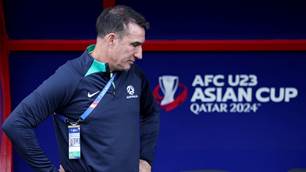It's a long time between drinks. So before we all go clamouring to the bar for another round, what have we had time to ponder?
Our system fails off the pitch, not on it
It's hard to make hard and fast rulings on an erratic match for the Olyroos, 90 minutes in which Australia ebbed and flowed through numerous personal and tactical approaches.
This lack of consistency is a stark contrast to what was occurring in the opposing dugout, dressing and boardroom. We can learn a lot from the losers tonight.
It's important to understand that Uzbekistan, despite facing enduring national challenges, have managed to become a model of consistency throughout the youth process.
They have maintained a familiar squad and tactical approach throughout the tournament, credit to the huge amount of experience (a la match fitness) these players garner in their increasingly high-quality domestic competition.
Every single one of their 23 man squad play domestically in the Uzbek Super League (a 14 team competition). All but five of them for top four clubs.
Travelling back through the years, this squad is also a linear progression of the youth teams that have competed in Uzbekistan's AFC U16 to U19 tournaments in past iterations.
The success of the central Asian nation's transitional system is the single most important factor allowing Uzbekistan to develop so quickly.
More than the oil money that pours into clubs like Bunyodkor and Pakhator, or the technical quality of their own players, this is why Uzbekistan have progressed from group stage knockouts to the defending champions of this competition.
It's why a team that have never beaten us at senior level could dominate large swathes of this match. Why they could produce superior individuals - like Azizjon Ganiev - in a restrictive organisational format. Why, having lost a goal and a man, they still appeared under control.
The lesson for Australian football - the charge upon fresh-blooded FFA CEO James Johnson, watching from the stands - extends far beyond the necessities of defensive organisation or the varying successes of one-touch football.
The systemic inconsistencies resulting in Australian youth failing to progress through age groups into the senior national teams are one of our largest challenges moving forward.

Invest in individuals
One of the most oft-repeated truisms in football is that of the 'game-changer'. The solo maestro of mystery that can take a stalemate in the palm of their hand and conjure a goal, a win, an Olympic qualification from nothing.
Tonight Nick D'Agostino was our magician. It was almost Jasurbek Yakhshiboev for the Uzbeks in the first half, as the canny midfielder dropped the shoulder and two Australian defenders before rifling his shot off Tass Mourdoukoutas' ankle.
But those one-percenters, so crucial to Australia in this modern Asian age, fell in the favour of one of the most consistent Graham Arnold Olyroos inclusions. Once again, it's a question of regularity.
Dagger was the man who sent us to the finals of this competition, stemming back to the tournament's qualifiers and that last gasp draw against South Korea. It was fitting that he was the man to send us to the Olympics.
Consistency is so valuable because it breeds confidence; the credence of the game-changer.
More overt in youth competitions, than the often stoically regimented senior level, the importance of players who not only believe in their own abilities, but their licence to back themselves in key moments, cannot be overstated.
Now, for this squad, the real challenge begins.
Before Tokyo in July, there are numerous Australians - no less than the likes of Daniel Arzani, Aaron Mooy, Tom Rogic, Mat Ryan - eagerly awaiting to usurp them and their Olympic dreams.
Before this tournament, Graham Arnold spoke mainly of the necessity of encouraging the Olyroos to believe in themselves.
"I believe that by the end of 2020 there will be five kids that will be part of the Socceroos squad," Arnie said before this tournament.
Hopefully, he believes it as much as they do.

12 years. What have we learnt?
If there is one incredibly specific lesson we can take from the last two matches alone, it's the importance of defensively-oriented midfielders that support each other in counter-attacking scenarios.
While there were several facets of the Olyroos play that impressed throughout this tournament - albeit, very few that repeated often - our ability to win key challenges was a massive advantage.
Our tackling ability was not only superior to the Uzbeks and the Syrians but to the South Koreans. It was reminiscent of the hardy, full-flung Olyroos of old. The Australian teams of Barcelona in 1992 and of Arnie's last charge, Beijing in 2008.
Keanu Baccus and Zach Duncan's influence at the heart of our midfield pivot was instrumental. They dictated the tempo, not through passing but through interruption.
They insisted upon an intensity that our Australian attackers simply didn't have the positional or technical sense to match. But it remained one of our most effective superiorities nonetheless.
It was the echo in spirit and magnetism of 2008's Olympic side; Ruben Zadkovich, Mark Milligan, Neil Kilkenny.
12 years have passed since our last Olympic qualification and we have tried so much and learnt absolutely nothing.
But perhaps, finally, that's not such a bad thing after all.
Related Articles

Campaign of pain: FA's Olyroos inquest will pile heat on Vidmar

Olyroos can't crack Jordan code in scoreless cup draw













